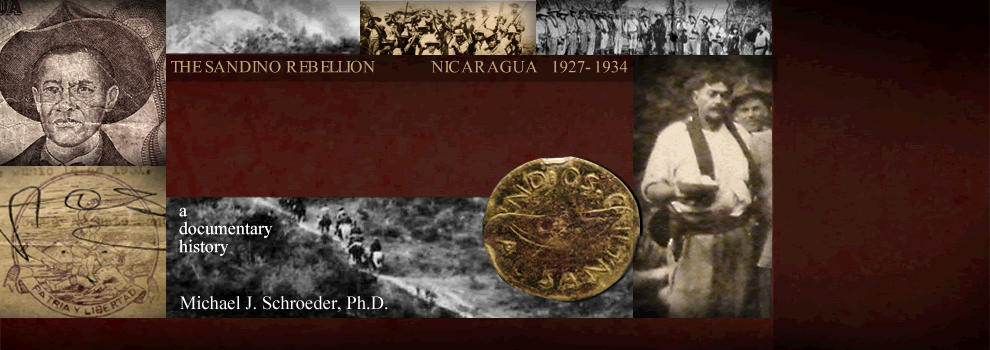|
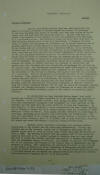
|
1. September 1,
1932. "Sandino Situation."
Confidential Intelligence
Report, U.S. Electoral Mission,
Managua, p. 1.
"NICARAGUA – Political. ¶
3020(d) ¶ Sandino Situation. ¶
Several unconfirmed reports have
been received during the month
of activity on behalf of Sandino
beyond the borders of Nicaragua.
It has been reported that agents
of Sandino have been very active
in Mexico buying arms and
munitions and enlisting
recruits. Reports have been
received from Honduras of the
shipment of arms and ammunition
into Nicaragua on a considerable
scale. The Nicaraguan press has
given more prominence to news
regarding Sandino than it has
done heretofore. A tendency has
been noted to magnify the
importance of Sandinism, and by
actual assertion and by general
implication to make Sandino a
major factor in Nicaraguan
affairs. He has become more of a
political than a military
factor. It is currently believed
that his forces have been
strengthened to an exaggerated
degree in arms, munitions and
men; and that the apparent
cessation of bandit operations
in the more populated districts
is due to the fact that he has
called his groups into the wilds
of northern Jinotega and eastern
Segovia to organize a big effort
designed to frustrate an
American supervised presidential
election in November. His
apparent inactivity joined with
a capable propaganda service has
tended to further introduce the
elements of uncertainty and
mystery into the situation and
have undoubtedly strengthened
his position in the popular
mind. All Nicaraguans regardless
of party affiliations or station
in life who have expressed
themselves are unanimous in the
opinion that with the withdrawal
of the Marines in January, the
country will face the certainty
of a revolution. Such an
atmosphere is extremely
favorable to the pretentions of
Sandino. Many persons in
Nicaragua to whom Sandino has
been heretofore a distant
quixotic person of no
consequence, are beginning to
wonder what may be about to
happen and are growing more and
more uneasy. If a loyal Guardia
Nacional under the vigorous and
disciplined direction of
American officers have just
barely contained Sandino for the
past two years of incessant
guerilla warfare, the average
Nicaraguan is under no illusions
as to what will likely happen
when the Guardia Nacional passes
to the control of uncertain
native officers. ¶ No
information has been received
during August that would justify
any revision of former estimates
as to the strength and equipment
of the bandits. It is believed,
however, that during the month
(August) they have done
considerable propaganda work
throughout the rural sections of
the Segovias and even down in to
the rural districts of Leon and
Chinandega. In many sections of
these districts a loose
organization has been formed
consisting of “Jueces de Mesta”
and local machete groups under
the direction of these so-called
“Jueces de Mesta”. Such groups
are very effective in furnishing
information, spreading false
reports, and terrorizing the
neighborhood. They also give
assistance to the larger groups
passing through a district by
furnishing guides, foraging,
etc. It is likely that in many
districts, these local groups
may cause considerable annoyance
during election time. ¶ General
police conditions throughout the
populous western departments of
the country are far from being
satisfactory. Robbery and
thievery are on the increase,
brawls are of increasing
frequency and the machete fights
that so often accompany these
brawls generally end in loss of
life or limb. The Guardia
Nacional with the greater part
of its forces engaged in that
part of the country menaced by
banditry does not have enough
men left to police the thickly
populated departments of western
Nicaragua with any reasonable
degree of adequacy. The country
is over-run with criminals due
to the appalling inefficiency of
the courts, lack of employment,
and the scarcity of police. Such
conditions are extremely
favorable to the activity of the
agents of Sandino and those
tendencies in Nicaraguan
politics which expect to profit
by Sandinistas agitation. The
potentialities which lie in such
a situation during the
excitement and intense
bitterness aroused by a
Nicaraguan presidential campaign
are not to be disregarded. . . .
"
|
|
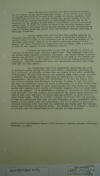
|
2. September 1,
1932. "Sandino Situation."
Confidential Intelligence
Report, U.S. Electoral Mission,
Managua, p. 2.
" . . . There has been
considerable talk about
increased activity by the
bandits during registration and
voting. It is rumored that
support is assured from official
or unofficial sources in Mexico,
supplying funds and munitions to
this end. In this connection,
popular gossip is to the effect
that the Mexican Government is
particularly anxious that on the
departure of the American forces
after a considerable period of
so-called intervention, it shall
not appear to other Latin
American countries that the
situation in Nicaragua has in
any way improved by such
intervention or that the United
States may justly claim any
definite benefits resulting to
Nicaragua therefrom. ¶ Strong
rumors have been received that
certain agencies in Nicaragua
are striving to bring about a
state of confusion throughout
the country before the date of
the elections such as to make
the holding of the elections
impossible. This is to be done
by increased activity of the
bandits and local disorders in
conjunction with banditry. Such
a movement is said to have
support in high government
circles. ¶ Sandino has
repeatedly stated that he
intends to prevent an election
in November under American
supervision. This announced
intention has gained great
currency throughout Nicaragua.
The United States Electoral
Mission has met with a marked
unfriendliness on the part of
the present government in
Nicaragua to its program of
supervising the coming
presidential elections. These
two tendencies while not
necessarily mutually supporting,
have much the same effect. ¶ The
Departments that have
experienced operations and raids
by Sandino’s groups during the
past year total a population,
according to 1920 estimates, of
425,000, or more than two thirds
of the total population of
Nicaragua. We know from the aid
and sympathy given these groups
in their operations that Sandino
has a large body of sympathizers
throughout these Departments.
The growing fear and uncertainty
as to what may happen after the
Marines withdraw from Nicaragua
in January is going to lead many
more who have not heretofore
taken any stock in Sandinism, to
incline to his side. As a
consequence, any show of force
which Sandino may make during
the coming months will receive a
more active and friendly
response from the people than he
has yet enjoyed. If he
undertakes a campaign of
terrorism by local groups well
scattered over the country,
which seems at the moment quite
probable, it will be much more
difficult to handle than any
movement in force which he could
likely make. While no positive
evidence is at hand that new
supplies of arms and ammunition
have been run into Nicaragua on
any appreciable scale, rumors to
that effect have been made the
situation may easily grow very
serious around registration and
election dates. For Sandino it
is largely a question of getting
arms and ammunition; men he can
get in large numbers. ¶
(Confidential Intelligence
Report, U.S. Electoral Mission,
Managua, Nicaragua, September 1,
1932.)"
|
|
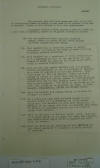
|
3. September 1,
1932. Confidential report
from Hq. Guardia Nacional,
Managua, p. 1.
"NICARAGUA – Political. ¶
3020(d) ¶ The principal jefes
with their groups are still at
the point of concentration
ordered by Sandino at some point
in the Pantasma Valley area or
Guapinol. Sandino is still
believed to be at this
concentration. ¶ A prominent
civilian of Nueva Segovia in
whom the Guardia has a great
deal of confidence, reports on
the general situation as
follows: ¶ (a)- That the bandits
are better organized, larger in
numbers, better led, better
trained, better equipped and
better fighters than ever
before. ¶ (b)- That SANDINO has
an efficient group of agents
throughout the country who keep
him well informed regarding
guardia movements. ¶ (c)- That
SANDINO has a semblance of civil
organization in the SEGOVIAS in
that he has appointed his own
Juezes de Mesta and some of the
other minor officials in certain
localities. ¶ (d)- That he and
many people believe that the
present bandit concentration is
for the purpose of drawing up a
plan of operation in the near
future. That their plan is for
the various Jefes and their
groups to return to their usual
haunts and at a specified time
for several groups to
simultaneously attack from two
to four guardia posts in order
to deny mutual support. The
posts he mentioned as the ones
most likely to be attacked are
YALI, CONDEGA, DARAILI,
PALACAGUINA, ESTELI and PUEBLO
NUEVO. ¶ (e)- That the bandits
are strong enough in numbers to
attempt the above. ¶ (f)- That
there are many good reliable
people in the various towns of
the SEGOVIAS who would gladly
fight with the Guardia, if arms
were available, in defense of
the towns, and that he believed
many would be willing to
accompany patrols in the field
if given their rations. ¶ (g)-
That he believes the various
bandit jefes, although to a
great extent in the game for
their own benefit, are
nevertheless quite loyal to
SANDINO and will obey his
orders. ¶ (h)- That the life of
any civilian of the SEGOVIAS who
has openly assisted the guardia
is worth nothing if captured. .
. . "
|
|
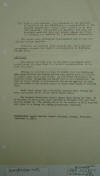
|
4. September 1,
1932. Confidential report
from Hq. Guardia Nacional,
Managua, p. 2.
" . . . (i)- That in his
opinion, the solution of the
problem of banditry in the
SEGOVIAS is a continuation of
the present policy with enough
more guardia to do the job
properly. He stated the Guardia
had done remarkable work but
were not strong enough to bring
the problem of banditry to a
successful conclusion. ¶ The
rains have increased
considerably and trails are bad
and river swallen [swollen?]. ¶
Northern and Central Area
patrols are operating
aggressively against the bandit
concentration in PANTASMA VALLEY
area. ¶ ESTIMATE: ¶ The number
of contacts in the PANTASMA
VALLEY Area established the fact
that the bandit concentration is
in that vicinity. ¶ Nothing has
occurred to change the opinion
that the bandits may make
demonstration and attack against
some guardia posts in Northern
or Central areas in the near
future. In fact added
information, as indicated above,
strengthens the belief that it
is a probability. The time for
these attacks is problematical
but may be expected any time
from the return of the various
groups to their usual haunts to
election time. ¶ Small local
groups will undoubtedly continue
their robbing and money
collections in all of the active
bandit areas. ¶ The Southern
Departments should remain quiet
during the week. It is believed
the small group which operated
in Chontales this past week has
been broken up. The maximum
effort of the bandits is still
expected just prior to or during
the coming presidential
elections. ¶ (Confidential
report from Hq. Guardia
Nacional, Managua, Nicaragua,
September 1, 1932.)"
|
|
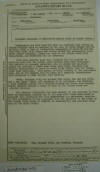
|
5. August 30,
1932. Naval Attaché,
Tegucigalpa. "Reported
Movements of Nicaraguan Bandit
Group on Patuca River."
"Information has been received
from the American Vice Consul in
Puerto Castilla that an American
by the name of Davis claims that
on 23 July, 1932, a band of
Sandinistas consisting of about
37 men who were well armed with
modern bolt action rifles and
sub-machine guns, under Simeon
Gonzalez, sacked his farm on the
Patuca River near Malapatante,
and destroyed all his property.
¶ This band probably came into
Honduras for the purpose of
carrying arms from the Patuca
River section back into
Nicaragua. This section is
sparsely inhabited, has no
police nor military guards and
provides a route over which arms
could normally pass without
interference as there is known
to be trails from the Patuca
River into Nicaragua. This
group, no doubt hearing of the
American’s farm, was of the
opinion that he might be a
possible interference with
shipments of arms through that
section. ¶ Davis, together with
his brother Jim Davis, his son
Jay Davis and a man named
“Dido”, all claiming to be
Americans, and Maddison a Dane
formerly worked for a logging
company and since that company
became defunct cleared a tract
of land on the Patuca river and
started farming. ¶ The Honduran
Government has been advised of
the presence in this area of
Nicaraguan bandits and of the
ease with which arms could be
smuggled into Nicaragua via this
unprotected and unobserved
section. In this connection it
was suggested that the policing
of the mouth of the Patuca River
might be helpful in intercepting
any possible shipment by the
above route. ¶ COPY FURNISHED:
Sec. Brigade USMC, and Guardia,
Managua."
|
|
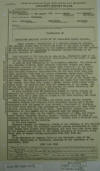
|
6. August 30,
1932. Naval Attaché,
Tegucigalpa. Translation
of "Operations Bulletin Issued
by the Nicaraguan Bandit
Sandino," p. 1.
"There follows a translation of
a bulletin issued by Sandino,
the original signed copy of
which was shown to the Naval
Attaché. It is believed to be of
interest in that Sandino
publishes for the benefit of his
followers his successes in
contacts already reported by the
Guardia Nacional of Nicaragua: ¶
NEWS BULLETIN OF THE E.D. de la
S.N. de N., (DEFENSIVE ARMY OF
THE NATIONAL SOVEREIGNTY OF
NICARAGUA) CORRESPONDING TO THE
MONTH OF JULY: ¶ For the
Indo-hispano observers: ¶ In
July we were victorious in the
following combats: Our forces of
the Atlantic Division, under
Generals Francisco Estrada and
Simon Gonzalez, attacked and
took the banana camp “BACKARO”,
of the north american [North
American] companies in Puerto
Cabezas. The enemy stationed in
that camp received immediate
reinforcements but our boys
drove them back also, capturing
from them the train, motorcars,
ammunition, rifles, and
machineguns. The buildings were
burned, and the next day a
squadron of aeroplanes bombarded
our column but one of the planes
was shot down. The air
bombardment informed the enemy
that they were near our forces,
with whom they fought a bloody
battle which lasted until night
fall. We estimate more than 100
casualties of the enemy. One of
our boys who died in this fight
carried the pouch containing the
documents of General Gonzalez,
which was lost. ¶ We were
informed that 25 amphibians
landed in Puerto Cabezas to
evacuate the families of north
americans [North Americans]
residing in that Port; we
believe this was a good idea of
theirs as the fate awaiting the
north americans [North
Americans] there is very black.
¶ Also during July on the 14th,
our forces under Colonel Ruperto
Hernández Roblero and Sergeant
Major Francisco García, had a
bloody engagement with the enemy
at “Los Achotes”, Department of
Jinotega, in which three traitor
dogs Lieutenants (Nicaraguans)
and nine Yankee pirates
(Americans) lost their life.
Also Colonel Roblero lost some
documents in this combat but he
captured arms and ammunition. ¶
Also, on July 16th, in “La
Rocía”, Department of León, our
forces under Colonel Zacarías
Padilla, fought a bloody combat
in which he captured ammunition
and food provisions. Padilla
lost a billfold with documents
related to his mission. ¶ At the
last minute: ¶ Generals Estrada
and Gonzalez, Chiefs of the
Division of the Atlantic inform
us that from the Honduran
Mosquitia strong contingents of
American troops have crossed
into Nicaragua, and that they
have their camp in the bannana
[banana] plantations of the
Yankee companies in Trujillo,
which leads them to expect
strong encounters from July 20th
on. ¶ Now: ¶ In my character of
Supreme Chief of the Defensive
Army of the National Sovereignty
of Nicaragua, manifest to the
observers of the continent,
that: ¶ (SEE PAGE TWO) . . . "
|
|
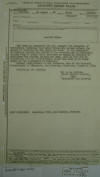
|
7. August 30,
1932. Naval Attaché,
Tegucigalpa. Translation
of "Operations Bulletin Issued
by the Nicaraguan Bandit
Sandino," p. 2.
" . . . Our Army has respected
and will respect the integrity
of territorial Honduras; that
great fraternity exists between
the people of Honduras and our
Army; but that: If the
Government of Honduras permits
the armies of the invaders and
of Nicaraguan traitor dogs to
cross their territory or encamp
in Honduras to facilitate the
attacks against our Army, THAT
WE WILL NOT BE RESPONSIBLE FOR
THE CONSEQUENCES, which will
have to be borne solely by the
Government of Honduras. ¶
General Headquarters of the
Defensive Army of the National
Souvereignty [Sovereignty] of
Nicaragua, Las Segovias,
Nicaragua, August 5, 1932. ¶
FATHERLAND AND LIBERTY. ¶ (s) A.
C. Sandino, ¶ CESAR AUGUSTO
SANDINO, ¶ ( Seal ) ¶ Fatherland
and liberty. ¶ COPY FURNISHED:
Sec. Brig. USMC, and Guardia,
Managua."
|
|
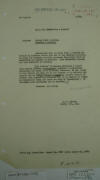
|
8. August 26,
1932. Military Attaché,
San José, Costa Rica.
"Banditry - Sandino."
"G-2 Report. ¶ 2,700. ¶
NICARAGUA (Population & Social)
¶ Subject: Public Order &
Safety. ¶ Banditry – Sandino. ¶
Information just received from a
reliable informant in Honduras
states that one of the Tijerino
brothers, as agent for Sandino,
recently purchased $14,000.00
worth of ammunition for Sandino
in Honduras. This ammunition
already has been delivered to
Sandino. ¶ “La Noticia” of
Managua published a report that
General Horacio Portocarrero,
Sandino’s presidential
candidate, was found to be in
Danlí, Honduras. He was called
to the capital and sent out of
the country to El Salvador via
Amapala and La Unión. Manuel
Balladares, another suspect of
contact with Sandino was
informed that if he desired to
remain in Honduras he could not
leave the city of Tegucigalpa.
He thereupon left ostensibly for
El Salvador. ¶ Sources: As
stated. ¶ A. R. Harris, ¶ Major,
G.S., M.A. ¶ From: M.A. Costa
Rica ¶ Report No. 1747 ¶ Date:
August 26, 1932."
|
|
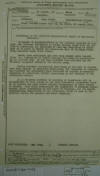
|
9. August 24,
1932. Naval Attaché,
Tegucigalpa. "Activities
of the Honduran Extraordinary
Forces on Nicaraguan Border."
"As result of representations by
the American Legation in this
city, the Honduran Government is
taking certain steps with the
object of preventing the
smuggling of arms and ammunition
to Nicaragua or at least to
create the impression that it is
doing everything possible along
those lines. ¶ Twenty five
additional men have been placed
under General Plata (the
Commandant of Danlí) bringing
his force to approximately one
hundred men. He has been
provided with uniforms and
additional equipment including
two machine guns. ¶ Having
received information that boats
on the Gulf of Fonseca have been
engaged in smuggling operations,
the President of Honduras has
directed the government boat
stationed at Amapala to exercise
vigilance in preventing illicit
operations in the vicinity of
the Nicaraguan border. ¶ It is
believed doubtful if anything of
importance will be accomplished
in this manner as the only
successful proceedure
[procedure] would be to capture
the arms before leaving
Tegucigalpa or other source of
origin. This would necessitate
the employment of reliable
secret agents, which practically
do not exist in Honduras, and
the hearty conscientious
cooperation of all officials,
which is next to impossible
during the present political
campaign. ¶ COPY FURNISHED: Sec.
Brig. Guardia Managua"
|
|
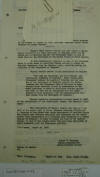
|
10.
August 23, 1932. Captain
Robert E. Cummings, Acting
Military Attaché, Mexico City.
Translation of "American Troops
Invade Honduras to Attack
Sandino,"
La Prensa,
August 20, 1932.
(see below)
|
|
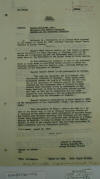
|
11.
August 23, 1932. Captain
Robert E. Cummings, Acting
Military Attaché, Mexico City.
Translation of "American Troops
Invade Honduras to Attack
Sandino,"
La Prensa,
August 20, 1932.
"G-2 Report ¶ 3850-a ¶ MEXICO ¶
POLITICAL ¶ SUBJECT: Foreign
Relations, etc:, ¶ Relations
with Foreign Countries. ¶
SANDINO and the Nicaraguan
Situation. ¶ 1. Following is a
translation of an article which
appeared in “La Prensa” of
August 20, 1932, entitled
“American Troops Invade Honduras
to Attack Sandino.” ¶ General
César Augusto Sandino has just
issued a proclamation throughout
the whole territory of Nicaragua
under his dominion and in
rebellion against the Government
which is held in power there by
the Government of the United
States of North America. ¶ In
this proclamation reference is
made to the tolerance which is
being shown in permitting Yankee
marines to attack the Sandino
insurgents from the Honduras
side,- possibly evading the
vigilance of the Government of
Honduras. ¶ General Sandino
states in his proclamation as
follows: ¶ “Our Army has
respected, and will respect, the
territorial integrity of
Honduras. There exists great
friendship between the people of
Honduras and our Army; but if
the Government of Honduras
permits Yankee invaders and the
Nicaraguan dogs of traitors to
cross through their territory or
set up cantonments in Honduran
territory in order to facilitate
attacks against our Army, we
will not be responsible for the
consequences of such tolerance,-
but the responsibility will rest
solely with the Government of
Honduras.” ¶ General Sandino’s
proclamation is dated August 5,
1932, at the headquarters of the
“Sandinista” rebels, Las
Segovias, Nicaragua. ¶ This
declaration of General Sandino
was made as a result of the
report sent to him by Generals
Francisco Estrada and J.
González to the effect that
heavy contingents of American
troops had crossed over Honduran
territory into Nicaragua and had
established their headquarters
in a petroleum camp belonging to
a Yankee company in Trujillo, in
order to attack the rear of the
Sandino forces, in view of the
defeats which they have been
sustaining in their encounters
with the Nicaraguan patriots. ¶
(“La Prensa”, August 20, 1932) ¶
Robert E. Cummings ¶ Captain,
Infantry, DOL ¶ Acting Military
Attaché ¶ Source: As stated. ¶
C/p ¶ From: M.A.Mexico. ¶ Report
No. 4109. ¶ Date: August 23,
1932."
|
|
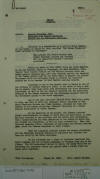
|
12. August 23,
1932. Captain Robert E.
Cummings, Acting Military
Attaché, Mexico City.
Translation of "The Yankee
Troops are being Decimated in
Nicaragua," La Prensa, p. 1.
"G-2 Report ¶ 3850-a ¶ MEXICO ¶
POLITICAL ¶ SUBJECT: Foreign
Relations, etc:, ¶ Relations
with Foreign Countries; ¶
SANDINO and the Nicaraguan
Situation. ¶ 1. Following is a
translation of an article which
appeared in “La Prensa” of
August 22, 1932, entitled “The
Yankee Troops are being
Decimated in Nicaragua:” ¶ The
patriots who follow Sandino have
fought furiously against the
invaders who are supporting
Moncada’s spurious government. ¶
During the month of July (1932)
there was heavy fighting in the
Las Segovias region of
Nicaragua, and much bloodshed,
where General Cesar Augusto
Sandino and his valiant patriots
which now number several
thousand men, have been fighting
against the invasion of the
Yankee marines sent by the White
House to the support the present
Government which has obligated
itself to protect the interests
created and to be created, in
that Central American country. ¶
According to one of the reports
sent to Mexico by one of the
officers of General Sandino’s
staff, in the month of July a
number of combats took place
which were outstanding for their
strategic importance, as well as
for the supplies captured and
the casualties suffered by the
Yankee invaders and the
Nicaraguan soldiers paid by the
Government allied to the North
Americans. ¶ One of the most
important combats, which took
place early in July, was that in
which the insurgent troops
commanded by Generals Francisco
Estrada and Simón González,
attacked and took possession of
the banana plantation “Backaro”
belonging to a Yankee company
established in Puerto Cabezas. ¶
At the beginning of the battle,
the Yankees received prompt
reinforcements in answer to
their call for assistance, as
they had been overcome by the
patriots; but the latter also
overpowered these reinforcements
and took possession of the
trains by which they had reached
the plantation, as well as their
automobiles. They also captured
numerous rifles, thousands of
cartridges and several
machine-guns, which the Yankees
abandoned in their flight. ¶
When the insurgent patriots
seized the banana plantation,
all the buildings formerly
occupied by employees and
laborers had been set afire by
the North Americans. ¶ On the
following day a fleet of
airplanes bombarded Sandino’s
column, but the patriots
succeeded in bringing down one
of the planes. The air
bombardment served to locate the
enemy which was approaching the
insurgent forces and against
whom a bloody fight was waged
until nightfall. ¶ From: M.A.
Mexico. ¶ Report No. 4108. ¶
Date: August 23, 1932. . . . "
|
|
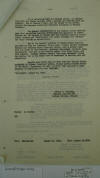
|
13. August 23,
1932. Captain Robert E.
Cummings, Acting Military
Attaché, Mexico City.
Translation of "The Yankee
Troops are being Decimated in
Nicaragua," La Prensa, p. 2.
" . . . It is calculated that
the Moncada forces, in
combination with the Yankee
marines, lost a hundred men
counting dead and wounded. One
of Sandino’s boys, who was
killed in the battle, carried
the knapsack containing
documents belonging to General
González. ¶ The general
headquarters of the Sandino
forces received news that
twenty-six American hydroplanes
had quartered in Puerto Cabezas
for the purpose of taking away
the American families living
there, because the “Sandinistas”
had almost beseiged [besieged]
the invaders and their families
or co-nationals. ¶ One of the
reports received in Mexico
states that on the 14th of July
the insurgent forces under
Colonel Ruperto Hernández
Roblero and Sergeant Major
Francisco García, held a bloody
fight with the enemy in “Los
Achotes”, Jintotega Department,
in which thee Lieutenants,
traitors to the Sandino cause,
lost their lives, and nine
Yankees. Colonel Roblero himself
lost some documents during the
battle, but on the other hand he
succeeded in seizing arms and
ammunition. ¶ Reports also state
that on July 16th the Sandino
forces commanded by Colonel
Zacarías Padilla, staged another
bloody battle in “La Rocia”,
Department of León, in which
they captured a large quantity
of ammunition and food supplies.
¶ “La Prensa”, August 22, 1932.
¶ Robert E. Cummings, ¶ Captain,
Infantry, DOL ¶ Acting Military
Attaché ¶ Source: As stated. ¶
C/p ¶ From: M.A. Mexico. ¶
Report No. 4108. ¶ Date: August
23, 1932."
|
|
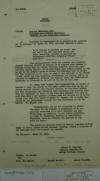
|
14. August 18,
1932. Captain Robert E.
Cummings, Acting Military
Attaché, Mexico City.
Translation of "Sandino's
Intentions,"
El Nacional,
Aug. 17, 1932.
"G-2 Report ¶ 3850-a ¶ MEXICO ¶
POLITICAL ¶ SUBJECT: Foreign
Relations, etc., ¶ Relations
with Foreign Countries; ¶
SANDINO and the Nicaraguan
Situation. ¶ 1. Following is
translation of an article which
appeared in “El Nacional” of
August 17, 1932, entitled
“Sandino’s Intentions”: ¶ He is
willing to abandon the fight,
but not until the last American
Marine has left. Meanwhile,
intends to continue his
belligerent attitude, defending
Nicaraguan soil. ¶ From
correspondence which has reached
the principal Central American
circles in Mexico, it is learned
that Sandino is willing to lay
down his arms,- but not,
however, until the last American
marine leaves. It is well known
that Sandino wishes to put an
end to the present state of
things in Nicaragua, and it is
now his firm intention to do
this, in view of the attitude of
the United States, which has
been gradually withdrawing its
forces, and it is proposed to
completely evacuate the country
after the Presidential elections
in Nicaragua to be held at the
end of this year. ¶ Dr. Pedro
José Zepeda, the representative
in Mexico of Sandino’s army, has
stated to the local press here
that he has received several
letters from General Sandino, to
the above effect, and that
everything now indicates that
Nicaragua will soon be free from
the vigilance to which it has
long been subject, but that it
will then face a new problem,
because when the marines go it
is believed that they will leave
in power Dr. Sacasa, who is
being supported by the
predominant forces, for the
Presidency of the Republic. Dr.
Zepeda adds: ¶ “Consequently,
for us the situation is almost
the same, but we propose to
counteract it by organizing
ourselves in a civil capacity
and participating, if possible,
in the coming elections, in
order to substitute Sandino as
Presidential Candidate, when he
fulfills his promise to lay down
his arms.” ¶ The agitation
recently noted in Central
American circles tends to form a
strong united nucleus, morally,
toward a solution of the
problems which now disturb the
country. ¶ “El Nacional”, August
17, 1932. ¶ Robert E. Cummings ¶
Captain, Infantry, DOL ¶ Acting
Military Attaché ¶ Source: As
stated. ¶ C/p ¶ From:
M.A.Mexico. ¶ Report No. 4101. ¶
August 18, 1932."
|
|
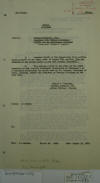
|
15. August 18,
1932. Captain Robert E.
Cummings, Acting Military
Attaché, Mexico City.
Translation of "The New Doctrine
of the United States is not Just
Toward Nicaragua," press release
by the local committee of the
Partido Reformador Autonomista
de Nicaragua,
Excelsior,
Aug. 10, 1932, p. 1.
"G-2 Report ¶ 3850-a ¶ MEXICO ¶
POLITICAL ¶ SUBJECT: Foreign
Relations, etc. ¶ Relations with
Foreign Countries: ¶ SANDINO and
the Nicaraguan Situation ¶
(Secretary Stimson’s Speech.) ¶
1. Attached hereto is the
translation of an article which
appeared in the local press of
August 10th entitled “The New
Doctrine of the United States is
not Just Towards Nicaragua”. ¶
2. This article, given to the
press by the local committee of
the “Partido Reformador
Autonomista de Nicaragua”, is a
statement criticizing the speech
made by Mr. Stimson, Secretary
of State, recently, before the
Committee on Foreign Relations,
in New York City. ¶ Robert E.
Cummings, ¶ Captain, Infantry,
DOL ¶ Acting Military Attaché. ¶
Source: As stated. ¶ C/p ¶ From:
M.A.Mexico. ¶ Report No. 4095. ¶
Date: August 12, 1932. . . . "
|
|
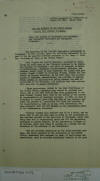
|
16. August 18,
1932. Captain Robert E.
Cummings, Acting Military
Attaché, Mexico City.
Translation of "The New Doctrine
of the United States is not Just
Toward Nicaragua," press release
by the local committee of the
Partido Reformador Autonomista
de Nicaragua,
Excelsior,
Aug. 10, 1932, p. 2.
" . . . (Translation[)] ¶
Article appearing in “EXCELSIOR”
of August 10, 1932. Mexico City.
¶ THE NEW DOCTRINE OF THE UNITED
STATES IS NOT JUST TOWARDS
NICARAGUA. ¶ Under the pretext
of protecting its nationals, the
Washington Government has
subjugated Nicaragua. ¶ The
Committee of the “Partido
Reformador Autonomista de
Nicaragua”, in this Capital,
makes the following statements
in regard to the new pacifist
doctrine announced by Mr. Henry
L. Stimson, Secretary of State
of the United States: ¶ “The
‘Comite del Partido Renovador
Autonomista’ which forms the
civil wing of the ‘Ejercito
Defensor de la Soberanía
Nacional de Nicaragua’, and
which is composed in Mexico of
professionals, newspaper
correspondents, students, and
workmen, cannot allow to pass
unnoticed the speech made
yesterday (August 9, 1932) by
Secretary Stimson before the
Committee on Foreign Relations,
in New York City, and in which
speech he condemnd [condemned],
substantially, the attitude of
nations which conceal an
imperialistic policy beneath the
mask of protection of its
nationals, and predicts that
such nations will soon have to
unmask themselves. ¶ “These
expressions, voiced by the high
functionary of the United
States, naturally have caused us
profound surprise, but at the
same time we take this
opportunity to remind Colonel
Stimson that, when he was acting
as the personal representative
of President Coolidge, in 1926,
he came to Nicaragua to impose
peace with the guns of his
cruisers and under the pretext
of ‘protecting the lives and
property of his co-nationals’,-
that is to say, with identically
the same arguments that are now
invoked as the fundamental cause
of his condemnatory discourse. ¶
“Colonel Stimson also declares
war to be a crime, and we would
like to ask him what name he
gives to the operations of the
American marines in the
territory of Nicaragua, where
they daily make use of
asphyxiating gases and all the
explosives condemned in modern
warfare, in the defenceless
villages of my country, whose
only blame is serving as a
refuge for the defenders of the
autonomy of our fatherland. ¶
“The new doctrine enunciated by
the Latin-American peoples, and
amply approved by the Government
of the United States, announces
that conquest by arms, of
territories and concessions,
must be declared absolutely
invalid in the eyes . . . "
|
|
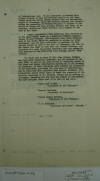
|
17. August 18,
1932. Captain Robert E.
Cummings, Acting Military
Attaché, Mexico City.
Translation of "The New Doctrine
of the United States is not Just
Toward Nicaragua," press release
by the local committee of the
Partido Reformador Autonomista
de Nicaragua,
Excelsior,
Aug. 10, 1932, p. 3.
"
. . . of International Law. We
are interested in knowing from
Colonel Stimson if this new
doctrine applies to the Canal
Treaty which the United States
wrested from the defenceless
people of Nicaragua, while the
American marines were
assassinating the companions of
General Benjamin F. Zeledon in
the battle of Masaya and took
prisoner General Luís Mena, to
be interned, without ant [any]
right whatever, in a dungeon of
the zone of the Canal. ¶ “
‘Moral reprobation, when
converted into reprobation of
the whole world, takes on a
character hitherto unknown’,
states Colonel Stimson.
Nevertheless, that moral
denouncement of the world, which
he proclaims as stigma for other
continents, has not been
sufficient to convince him that
justice should be done in the
case of Nicaragua, and that we
who defend the right to live
free and without tutelage, are
deserving of a more respectful
treatment than has generally
been accorded to men identified
with General Augusto César
Sandino. ¶ “We would like to
know if this time Colonel
Stimson has completely forgotten
Nicaragua, and his mission in
the year 1926, as well as the
long period of suffering caused
by the armed and bloody
intervention maintained in our
country; as otherwise, he would
certainly have ordered the
evacuation of our territory, now
under the iron heel of
intervention,- and he would not
have permitted that Admiral
Woodward, with dictatorial
powers which place in doubt the
sincerity of the doctrine
announced by Mr. Stimson, should
now be serving in Nicaragua,
trampling all the laws and
rights of Nicaraguans, who have
declared their wish to be free
at any cost. ¶ “Pedro José
Zepéda, ¶ “Secretary of the
Interior”. ¶ “Horacio Espinosa,
¶ “Secretary of Relations”. ¶
“Victor Manuel Mercado, ¶
“Secretary of the Treasury”. ¶
“J. C. Gonzalez, ¶ “Secretary of
(“Actas”) Records.”"
|
|
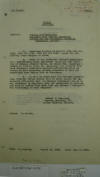
|
18. August 8,
1932. Captain Robert E.
Cummings, Acting Military
Attaché, Mexico City.
"Sandino and the Nicaraguan
Situation (Hernandez' Letters),"
p. 1.
"G-2
Report ¶ 3850-a ¶ MEXICO ¶
POLITICAL ¶ SUBJECT: Foreign
Relations, etc. ¶ Relations with
Foreign Countries: ¶ SANDINO and
the Nicaraguan Situation. ¶
(Hernandez’ Letters) ¶ 1.
Reference is made to Report
4026, July 12; 4050, July 22;
4058, July 28; and 4068, August
2d; all 3850-a,- same subject as
above. ¶ 2. There is now
forwarded herewith memorandum of
a conversation which Ambassador
Clark had with Minister of
Foreign Affairs Tellez, on
August 3rd, regarding a series
of letters which the Ambassador
has received from José Hernández
containing certain information
which he claims to have
regarding alleged shipments of
arms and ammunition from Mexico
City to Nicaragua. ¶ 3. As will
be noted from the attached
memorandum, Minister Tellez
stated that he could assure the
Ambassador officially that the
Mexican Government was in no way
concerned in supplying arms and
ammunition to Sandino and that
he doubted very much that any
officer (“oficial”) was
trafficking in such supplies. ¶
Robert E. Cummings, ¶ Captain,
Infantry, DOL ¶ Acting Military
Attaché. ¶ Source: As stated. ¶
C/p ¶ From: M.A.Mexico. ¶ Report
No. 4082. ¶ Date: Aug. 8, 1932.
. . . "
|
|
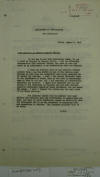
|
19. August 8,
1932. Captain Robert E.
Cummings, Acting Military
Attaché, Mexico City.
"Sandino and the Nicaraguan
Situation (Hernandez' Letters),"
p. 2: México, August
3, 1932. Memorandum of
Conversation, the Ambassador J.
R. Clark with Mexican Minister
of Foreign Affairs Téllez.
" . . . C O P Y ¶ MEMORANDUM OF
CONVERSATION ¶ THE AMBASSADOR ¶
México, August 3, 1932 ¶ with
Minister of Foreign Affairs
Téllez. ¶ On the way to and from
Cuernavaca today, to pay a visit
of respect to General Calles, I
had the following conversation
with Minister Téllez, who took
me over and acted as my
interpreter in my conversation
with the General. ¶ I told the
Minister that we had received
several letters from a man who
stated he was in the Mexican
army, telling us that arms and
ammunition were being smuggled
out of Mexico for Sandino. I
said I had merely forwarded
these to the Department of
State; that we had made no
acknowledgment of them to the
man, and I had received no
instructions regarding the
reports. I added that recently
the man had called at the
Consulate in Veracruz and had
made various specific statements
regarding these shipments, and
had asked for money. I said I
thought the latter was the real
point in the whole activity. ¶
The Minister stated that he
doubted very much whether any
official even was trafficking in
ammunitions and arms, and that
he could absolutely assure me
officially that the Government
was in no way concerned in
supplying arms and ammunition to
Sandino. The Minister repeated
this to me twice. ¶ J.R.C."
|
|
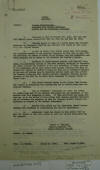
|
20. August 2,
1932. Captain Robert E.
Cummings, Acting Military
Attaché, Mexico City.
"Sandino and the Nicaraguan
Situation" [Hernandez' Letters],
p. 1. "G-2
Report ¶ 3850-a ¶ MEXICO ¶
POLITICAL ¶ SUBJECT: Foreign
Relations, Etc. ¶ Relations with
Foreign Countries: ¶ SANDINO and
the Nicaraguan Situation. ¶ 1.
Reference is made to Reports
Nos. 4026, 4050 and 4058 (all
3850-a) dated respectively July
12, July 22, and July 28, 1932.
¶ 2. Attached hereto is copy of
a letter dated July 27, 1932,
addressed to Ambassador Clark by
the American Vice Consul at Vera
Cruz, V.C., Mr. William Karnes.
¶ 3. As will be noted, this
letter states that José
Hernández presented himself at
the American Consulate in Vera
Cruz on July 27th and described
the manner in which, as he
alleges, arms and ammunition
were being smuggled out of
Mexico to San Salvador for
Sandino’s forces. ¶ 4. Hernández
it seems accuses General José
Mendivil Talamante, the
commanding officer of the 35th
Infantry Battalion in Tapachula,
and other officers and soldiers
of the same battalion, of being
involved in the smuggling; and
he also states that Mexican
citizens have been recruited for
service in Sandino’s army; and
that one of Sandino’s generals
by the name of Morales came to
Tapachula several weeks ago with
letters for General Calles, and
that General Mendivil Talamante
detailed Captain Quintana of the
35th Bn., to bring these
documents to General Calles in
Mexico City. ¶ 5. Vice Consul
Karnes states in his letter that
Hernández’ object in furnishing
this information was to obtain
money from the American Embassy.
¶ 6. Even if Hernández’
statements are true, the Acting
M/A doubts very much if the
Mexican Government has any
knowledge or connection with
this smuggling of arms. If such
activities are being carried on,
it is the belief of this office
that General Mendivil Talamante
and his officers are engaging in
them for personal profit,
without the knowledge or consent
of the Mexican Government. ¶ 7.
Neither this office nor the
Ambassador intend corresponding
with Hernández or remunerating
him for his information. ¶ 8.
Ambassador Clark has stated to
this office that he does not
intend to take this matter up
with the Mexican Government for
the present. ¶ Robert E.
Cummings, ¶ Captain, Infantry,
DOL ¶ Acting Military Attaché. ¶
Source: As stated. ¶ From:
M.A.Mexico. ¶ Report No. 4068. ¶
Date: August 2, 1932. . . . "
|
|
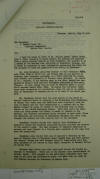
|
21. August 2, 1932.
Captain Robert E. Cummings,
Acting Military Attaché, Mexico
City. "Sandino and the
Nicaraguan Situation"
[Hernandez' Letters], p. 2:
July 27, 1932. William
Karnes, American Vice-Consul,
Veracruz, Mexico, to the
Honorable J. Reuben Clark, Jr.,
American Ambassador, Mexico
City.
"
. . . C O P Y ¶ CONFIDENTIAL ¶
AMERICAN CONSULAR SERVICE ¶
Veracruz, Mexico, July 27, 1932.
¶ The Honorable ¶ J. Reuben
Clark, Jr., ¶ American
Ambassador, ¶ Mexico City,
Mexico. ¶ Sir: ¶ I have the
honor to refer to Mr. Stanley
Hawks’ letter dated July 6,
1932, relative to three letters
the Embassy had received from a
person signing himself as José
Hernández, who claimed to be a
member of the Mexican Army
stationed at Tapachula, Chiapas,
and in which he purported to
have information concerning the
plans for the shipment of arms
and ammunition from Mexico to
Nicaragua. ¶ Mr. José Hernández
presented himself in this
Consulate today, July 27th. 1932
at 11:00 A.M. and stated that he
had arrived at Veracruz from
Tapachula yesterday on a train
carrying the household effects
and automobile of General Lucas
Gonzalez. He claims to be a
corporal in the Mexican army in
the 35th. Battallion [Battalion]
commanded by General José
Mendivil Talamante stationed at
Tapachula, Chiapas. He also
claims that he came to Veracruz
under a permit which expires
August 15th. 1932. He wishes the
strictest confidence kept
concerning his revelations since
the act he is committing is
tantamount to treason and he is
in fear of the death penalty. ¶
Mr. Hernández states that the
arms arrive at the ranch of
General Mendivil which is
situated a few kilometers from
Tapachula. He claims that these
arms and munitions come
originally from the city of
Mexico and are then transported
by a sargent [sergeant?] and by
Hernández himself by means of
trucks to the frontier town of
Unión Juarez on the
Mexico-Guatemala border. From
this point the munitions are
taken across the border in sacks
of tobacco or dry shrimps, one
thousand cartridges being
included in each sack. There the
munitions are delivered to
Guatemalan subjects who carry
them through the country and
ship them by rail to San
Salvador. ¶ Hernández further
states that General Juan
Colindres of Sandino’s forces
has recently recruited Mexican
citizens for service in the
latter’s army. The last shipment
of recruits consisted of seventy
and went forward in a fishing
boat carrying at the same time
arms and ammunition. ¶ Hernández
also claims that one of
Sandino’s Generals by the name
of Morales came to Tapachula
about twenty days ago with
letters for General Calles and
that General Mendivil
immediately sent Captain
Quintana of his forces to take
these documents to General
Calles in Mexico City. ¶ Mexican
Army rifles have also been sent
across the border according to
Hernández. These are of the
Mausser [Mauser] type
manufactured in Oviedo, Spain.
With respect to the cartridges
Hernandez says that they do not
have any distinctive marks, but
that they are made by the
Fabrica Nacional de Cartuchos in
Mexico City. . . . "
|
|
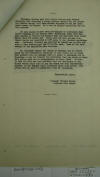
|
22. August 2, 1932.
Captain Robert E. Cummings,
Acting Military Attaché, Mexico
City. "Sandino and the
Nicaraguan Situation"
[Hernandez' Letters], p. 3:
July 27, 1932. William
Karnes, American Vice-Consul,
Veracruz, Mexico, to the
Honorable J. Reuben Clark, Jr.,
American Ambassador, Mexico
City.
"
. . . Hernandez further says
that within fifteen days General
Francisco Diaz Hernandez a
former Mexican General who has
joined the Sandino forces, will
take another shipment of men and
armaments across the border. He
is now in Tampico recruiting men
for this purpose. ¶ He also
claims to have seen photographs
of Lieutenant Juan Castro
Figueroa of the Mexican 35th.
Battallion [Battalion] taken
with General Sandino to whom he
had brought arms and munitions
from Puerto Mexico some two
months ago. These arms had been
shipped from Puerto Mexico and
consisted of 100 cases of one
thousand cartridges each.
Lieutenant Figueroa was escorted
by twenty men on this mission to
whom Sandino paid $25.00 U.S.Cy.
each. None of the individuals of
the expedition wore uniforms. ¶
Mr. Hernandez reason for coming
to Veracruz was to obtain money
for the information contained in
this letter and he hoped that
someone from the Embassy might
be named to accompany him to
Tapachula to see for himself the
activities that are going on
there. This office gave him no
encouragement in these plans. In
fact, it told him that was very
unlikely that the Government of
the United States would care to
pay any money for this
information. However, if the
Embassy feels different about
this manner, this office will be
glad to communicate with Mr.
Hernández. ¶ Respectfully yours,
¶ (Signed) William Karnes ¶
American Vice Consul"
|
|
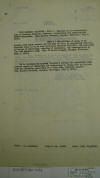
|
23. July 28, 1932.
Captain Robert E. Cummings,
Acting Military Attaché, Mexico
City. Sandino and the
Nicaraguan Situation - Misc.
Intelligence Reports.
"JUAN GREGORIO COLINDRES – June
2 – Reported in his headquarters
camp at Malacate Mountain,
Honduras, reorganizing and
preparing for future operations.
(Hq. Guardia Nacional, Managua,
Nicaragua, July 1, 1932.) ¶ June
6 – One of Jefes of group of 25
bandits with which contact was
had west of Yali, at coordinates
(224-332). Reported later to be
in camp on Malacate Mountain
(212-412), and supposedly in
charge of recruiting, securing
of ammunition, and
communications to and from
Sandino’s camp. (Hq. 2d Marine
Brigade, Managua, Nicaragua,
July 1, 1932.) ¶ It is believed
the bandits (Sandino’s forces)
are conserving their present
supply of ammunition and
endeavoring to obtain more in
preparation for extensive
operations at a later date
(probably August). (Hq. Guardia
Nacional, Managua, Nicaragua,
July 1, 1932.) ¶ From:
M.A.Mexico. ¶ Report No. 4058. ¶
Date: July 28, 1932."
|
|
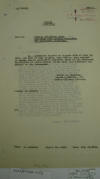
|
24. July 28, 1932.
Captain Robert E. Cummings,
Acting Military Attaché, Mexico
City. Translation of
"still another letter from José
Hernández addressed to the
Ambassador," p. 1.
"G-2 Report ¶ 3850-a ¶ MEXICO ¶
POLITICAL ¶ SUBJECT: Foreign
Relations, etc. ¶ Relations with
Foreign Countries: ¶ The
Nicaraguan Situation. ¶ 1.
Reference is made to Reports
4026 of July 12, 1932, and 4050
of July 22, 1932, both 3850-a,
same subject as above; and in
connection therewith there is
now forwarded translation of
still another letter from José
Hernández addressed to the
Ambassador. ¶ Robert E.
Cummings, ¶ Captain, Infantry,
DOL ¶ Acting Military Attaché. ¶
Source: As stated. ¶ C/p ¶ From:
M.A.Mexico. ¶ Report No. 4058. ¶
Date: July 28, 1932. . . . "
|
|
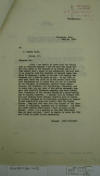
|
25. July 28, 1932.
Captain Robert E. Cummings,
Acting Military Attaché, Mexico
City. Translation of
"still another letter from José
Hernández addressed to the
Ambassador," p. 2: July
21, 1932. José Hernández,
Tapachula, Chiapas, to Mr. J.
Reuben Clark, Mexico, D.F.
" . . . (Translation) ¶
Tapachula, Chis. ¶ July 21,
1932. ¶ Mr. ¶ J. Reuben Clark, ¶
Mexico, D.F. ¶ Esteemed Sir: ¶
Since I was unable to leave here
for Mexico City or Veracruz
because I did not have the money
for the trip owing to the
illness of my family and it is
very urgent that I speak to you
personally, but now that it is
possible with the transfer of
General Lucas González to
Veracruz I spoke to him and I am
leaving for Veracruz for I wish
to speak to you. On the 15th of
next next month the first of my
two months’ leave will have
terminated and in order that you
may be informed of the shipment
of ammunition leaving Union
Juarez, Chiapas, for Honduras,
via Tlaltenango, Guatemala, and
in order that you may know of
the entire movement, General
José Mendivil Talamante recently
was with Colonel Juan Altamirano
of the Sandino forces on a ranch
belonging to General Mendivil. I
learned that he brought with him
many letters which General
Mendivil sent to Mexico by
Captain Quintana to be delivered
personally to General Calles
immediately upon his arrival
from the United States. They say
that they have the support of
the Presidents of Guatemala,
Honduras and El Salvador. And
there are other matters about
which I wish to speak to you
person. Since I am a soldier of
the 35th Battalion, when my
leave expires I shall be unable
to leave the City and I wish to
speak to you personally. ¶
(Signed) JOSÉ HERNANDEZ"
|
|
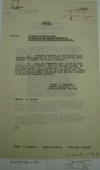
|
26. July 22, 1932.
Captain Robert E. Cummings,
Acting Military Attaché, Mexico
City. Translation of "A
Message for General Moncada,"
Excelsior, July 19,
1932, p. 1.
"G-2 Report ¶ 3850-a ¶ MEXICO ¶
POLITICAL ¶ SUBJECT: Foreign
Relations, etc. ¶ Relations with
Foreign Countries: ¶ SANDINO and
the Nicaraguan Situation. ¶ 1.
Forwarded herewith is
translation of an article which
appeared in “EXCELSIOR” of July
19, 1932, entitled “A Message
for General Moncada”. ¶ 2. Also,
in connection with Report
No.4026 (3850-a) of July 12,
1932, there is attached hereto,
for the information of G-2,
translation of another letter
addressed to the Ambassador by
José Hernández who claims to be
a Mexican soldier stationed with
the 35th Infantry Battalion, in
Tapachula, Chiapas. ¶ Robert E.
Cummings, ¶ Captain, Infantry,
DOL ¶ Acting Military Attaché. ¶
Source: As stated. ¶ C/p ¶ From:
M.A.Mexico. ¶ Report No.40.50. ¶
Date: July 22, 1932. . . . "
|
|
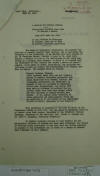
|
27. July 22, 1932.
Captain Robert E. Cummings,
Acting Military Attaché, Mexico
City. Translation of "A
Message for General Moncada,"
Excelsior, July 19,
1932, p. 2.
" . . . (New item – EXCELSIOR –
July 19, 1932[)] ¶ (Translation)
¶ A MESSAGE FOR GENERAL MONCADA
¶ Nicaraguans residing here wish
to confirm a decree ¶ Many will
make the trip ¶ If the Dictator
of Nicaragua is sincere, they
may be able to develop political
activities ¶ The Group of
Nicaraguan Autonomists, who
support the attitude of General
Augusto Cesar Sandino, who is
defending the integrity of his
fatherland, in a meeting held
last evening at No. 22 Versalles
street, decided to send to Mr.
José Maria Moncada a message in
view of the publication in the
press yesterday of a telegram
from Managua, in which it is
assured that the Government of
that country has signed a decree
of general amnesty, which seeks
to favor, principally, the
political expatriates as well as
friends and representative of
General Sandino in Mexico. The
message reads as follows: ¶
“General Moncada, Managua. ¶
Press reported today that you
had signed a decree of amnesty
including autonomist elements
identified with General Sandino.
The Nicaraguan autonomists are
interested in knowing if you are
disposed to recognize, within
your jurisdiction, the rights
that they have as citizens to
maintain the political ideas
that they have always upheld and
will continue to uphold without
surrender. If so, please order
Consulate to issue passports and
safe-conducts which may be
solicited of it for return to
the Fatherland. ¶ HORACIO
ESPINOSA, Secretary of the
Exterior.” ¶ This committee is
composed of the best elements of
the Nicaraguan Colony in this
City, and the Board of Directors
consists of Doctor Pedro José
Zepeda, Secretary of the
Interior; Horacio Espinosa,
Secretary of the Exterior; Lic.
Victor M. Mercado and Sr. José
C. Gonzalez, Recording
Secretary. ¶ In Central American
circles in this Capital the
unexplainable attitude of
Moncada has been much discussed,
his change of attitude being
attributed to the fact that the
entire populace is opposed to
his government and in favor of a
change of government (régimen)
in that country."
|
|
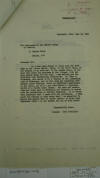
|
28. July 21, 1932.
José Hernández, Tapachula,
Chiapas, to the Ambassador of
the United States of America, J.
Reuben Clark, México, D.F.
"(Translation) ¶ Tapachula,
Chis. July 13, 1932 ¶ The
Ambassador of the United States
of America, ¶ J. Reuben Clark, ¶
Mexico, D.F. ¶ Esteemed Sir: ¶
As I have been unable to leave
here for that City or for Puerto
Mexico, owing, in the first
place, to the illness of my wife
and, in the second place, to the
fact that after the expenses of
the illness I did not have
enough money for the trip, I am
writing you the following very
interesting information: Mr.
Juan G. Colindres, who claims to
be a General of the Liberating
Army of Nicaragua, was in this
City and conferred with General
Lucas Gonzalez, Chief of
(Military) operations in the
State, and with a man from
Mexico, a representative of a
Doctor Pedro Zepeda. The arms
and ammunition are being sent to
Guatemala and Honduras in accord
with the authorities of certain
Republics. It is therefore
important that I speak with you
personally. I only await the
receipt of some money that I am
expecting to depart for Mexico
City or Puerto Mexico, it being
very important (that I do so)
before the end of this month. ¶
Respectfully yours, ¶ (Signed)
JOSE HERNANDEZ"
|
|
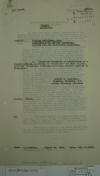
|
29. July 28, 1932.
Captain Robert E. Cummings,
Acting Military Attaché, Mexico
City. Translation of
"Patriotic Sentiment has been
Greatly Revived in Nicaragua,"
Excelsior, July 15,
1932, p. 1.
"G-2 Report ¶ 3850-a ¶ MEXICO ¶
POLITICAL. ¶ SUBJECT: Foreign
Relations, etc. ¶ Relations with
Foreign Countries: ¶ SANDINO and
the Nicaraguan Situation. ¶ 1.
Forwarded herewith is
translation of a recent article
appearing in “EXCELSIOR” of July
15, 1932, entitled “Patriotic
Sentiment has been Greatly
Revived in Nicaragua”. ¶ Robert
E. Cummings, ¶ Captain,
Infantry, DOL, ¶ Acting Military
Attaché. ¶ Source: Press. ¶ C/p
¶ From: M.A.Mexico. ¶ Report No.
4041. ¶ Date: July 15, 1932. . .
. "
|
|
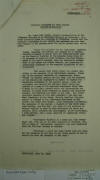
|
30. July 28, 1932.
Captain Robert E. Cummings,
Acting Military Attaché, Mexico
City. Translation of
"Patriotic Sentiment has been
Greatly Revived in Nicaragua,"
Excelsior, July 15,
1932, p. 2.
" . . . (TRANSLATION) ¶
PATRIOTIC SENTIMENT HAS BEEN
GREATLY REVIVED IN NICARAGUA ¶
Dr. Pedro José Zepeda, general
representative of the “Ejercito
Defensor de la Soberanía
Nacional de Nicaragua”, in a
brief interview given to a
reporter of EXCELSIOR, stated
that the patriotic conscience of
his country was awakened now
more than ever because of the
anarchy among the public
authorities; and he added: ¶
“While the aspirants to the
Presidency, Argüello, Sacasa,
Espinosa, and others, are
engaged in an ignoble, cringing
struggle to obtain from the
Interventionist power the favor
of figuring in the shameful
farce which it is proposed to
carry out next November, the
true Nicaraguans of all social
classes, from the University
student down to the modest and
simple laborer, are preparing to
effectively cooperate in the
complete liberation of the
Fatherland. ¶ “The latest news
items reveal the present
condition in the interior of my
unfortunate country. Young men
in the streets, unmindful of
consequences, shout “Vivas’ to
General Sandino and his Army,
and the soldiers of the Invader
are inadequate in number to
repress the rebellious outbreaks
of the popular masses, while men
everywhere are leaving the
National Guard (which was
created as a prop to the
spurious Government lying like a
larva in the great pustule which
the intervention has created, to
hatch other Moncadas in compact
and organized groups), and
swelling the ranks of our Army.
The latest patriotic gesture of
this sort occurred a few days
ago when Lieutenant of the
Guard, Roberto González
Parrales, second in command of
the detachment stationed in San
Isidro, six miles from Esteli,
after capturing J.H. Smenler,
the commander of the Sector, a
Captain of the North American
Marines, had him shot, and took
all his soldiers to General
Sandino to whom he also
delivered his whole war arsenal,
which included six machineguns,
14,000 cartridges, a
bomb-thrower, and a large
quantity of regulation rifles
and pistols. ¶ “Lieutenant
González is a young man only
twenty years old, from one of
the best families of Diriamba,
who, with a group of
‘aguiluchos’ (eaglets), has just
graduated from the Military
Academy of Managua. ¶ “Naturally
a price has been placed upon his
head, but the invaders do not
dare to get close enough to him
to snatch him from the redoubts
of our Army.” ¶ (EXCELSIOR, July
15, 1932)"
|
|
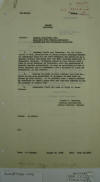
|
31. July 12, 1932.
Captain Robert E. Cummings,
Acting Military Attaché, Mexico
City. Letters of José
Hernández on arms shipments to
Sandino, p. 1.
"G-2 Report ¶ 3850-a ¶ MEXICO ¶
POLITICAL ¶ SUBJECT: Foreign
Relations, etc. ¶ Relations with
Foreign Countries: ¶ SANDINO and
the Nicaraguan Situation. ¶ 1.
Attached hereto are forwarded,
for the information of G-2,
translations of three letters
recently written to Ambassador
Clark by one José Hernández who
states he is a Mexican soldier
stationed with the 35th Infantry
Battalion in Tapachula, Chiapas.
Hernández claims in his letters
that a plan is being fomented in
Tapachula, with the connivance
of certain Mexican authorities,
to send an expedition of two or
three thousand men to Nicaragua,
with a shipment of arms and
ammunition, to aid Sandino. ¶ 2.
Nothing is known of this
soldier, nor have reports of any
such expedition or shipment of
arms been received by this
office. It is probably just a
scheme hatched by Hernández to
obtain money from the American
Embassy to pay his passage to
Mexico City. ¶ 3. Ambassador
Clark has made no reply to these
letters. ¶ Robert E. Cummings ¶
Captain, Infantry, DOL ¶ Acting
Military Attaché ¶ Source: As
stated. ¶ C/p ¶ From:
M.A.Mexico. ¶ Report No. 4026 ¶
Date: July 12, 1932. . . . "
|
|
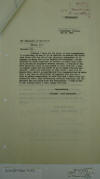
|
32. July 12, 1932.
Captain Robert E. Cummings,
Acting Military Attaché, Mexico
City. Letters of José
Hernández on arms shipments to
Sandino, p. 2: José
Hernández, Tapachula, Chiapas,
to the Ambassador of the United
States of America, J. Reuben
Clark, México, D.F., May 28,
1932.
" . . . (Translation) ¶
Tapachula, Chiapas, ¶ May 28,
1932. ¶ The Ambassador of the
U.S.A. ¶ México, D.F. ¶ Esteemed
Sir: ¶ Although I have not the
honor of your acquaintance, (I
am writing) to see if it is
possible to prevent the
bloodshed which with the aid of
our principal commanders it is
planned to carry out in the
Republic of Nicaragua. An
expedition is being organized to
consist of about from 2,000 to
3,000 men to reinforce General
Sandino. I belong to the 35th
Battalion which is garrisoned in
this City but I plan to request
leave for one month to go to
speak with you personally. About
the beginning of next month I
shall be in Mexico City, only I
am sending you this
communication in order that I
may have no difficulty in
speaking with you for I have to
return immediately to this City
and I shall tell you personally
where they contemplate entering
Nicaragua and the officers who
are going with the Nicaraguans.
I beg of you to say nothing
until I have spoken with you. ¶
Respectfully, ¶ (Signed) José
Hernández. . . . "
|
|
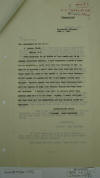
|
33. July 12, 1932.
Captain Robert E. Cummings,
Acting Military Attaché, Mexico
City. Letters of José
Hernández on arms shipments to
Sandino, p. 3: José
Hernández, Tapachula, Chiapas,
to the Ambassador of the United
States of America, J. Reuben
Clark, México, D.F., June 6,
1932.
" . . . (Translation) ¶
Tapachula, Chiapas, ¶ June 6,
1932. ¶ The Ambassador of the
U.S.A. ¶ J. Reuben Clark, ¶
México, D.F. ¶ With reference to
my letter of last month and to
my message contained therein, I
have requested a month’s leave
and am expecting a reply soon
from the Ministry of War. As
soon as it arrives I shall leave
for that City and will be there
about the 15th of the month(.)
On the first instant, 15,000
rounds of ammunition for 7 m/m
Mauser rifles were shipped.
Several people who came here
from Nicaragua have left for
Mexico to talk with General
Calles and they have not
returned. I believe they went to
arrange about some machine guns
but I am not sure. Anyway, I
shall tell you how they take out
the ammunition and the crossing
point in Guatemala. ¶
Respectfully yours, ¶ (Signed)
José Hernández . . . "
|
|
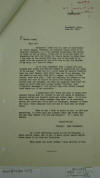
|
34. July 12, 1932.
Captain Robert E. Cummings,
Acting Military Attaché, Mexico
City. Letters of José
Hernández on arms shipments to
Sandino, p. 4: José
Hernández, Tapachula, Chiapas,
to the Ambassador of the United
States of America, J. Reuben
Clark, México, D.F., June 24,
1932.
"(Translation) ¶ Tapachula,
Chis., ¶ June 24, 1932. ¶ Mr. ¶
J. Reuben Clark, ¶ Dear Sir: ¶
Tomorrow I leave for the port of
Minatitlán or Puerto Mexico,
Veracruz, at whichever place
there is an American Consulate,
as I was granted permission, but
having no funds to get me there,
I want you to do me the favor of
communicating with the Consul in
Puerto Mexico in order that I
may take up the matter with him,
for if you wish me to speak with
you personally you will have to
pay the expense of my trip, as I
have no money. ¶ It is very
important that I speak with you,
because 200 rifles and 150,000
rounds of ammunition are about
to be shipped. They are on a
ranch owned by General Mendivil
near the port (barra) from which
they are to be shipped, for the
ranch is not more than half a
league, or about 2 kilometers,
from this port. They are
awaiting the return of the
persons who went to Mexico to
speak with General Calles,
before they are shipped, and
they are removing them from the
cases in which they were packed
marked “National Army”
(“Ejercito Nacional”), and
putting them into others brought
from Mexico as if for preserves.
¶ I understand that those who
went to speak with General
Calles went to Pachuca to get
100 cases of dynamite. General
Calles and General Amaro are
aiding them. It is said that
they are in a hurry because they
want to do something before the
elections to be held in
Nicaragua, because of those who
came, three remained here and
one of them told me everything.
¶ That is why I wish to speak to
you, to tell you everything, in
order that you (plural form) may
catch them the day they embark
(“el día que salgan”). So I
leave tomorrow. ¶ Respectfully,
¶ (Signed) José Hernández ¶ If I
have sufficient money to get to
Veracruz, I shall arrive there,
and if not (I shall go) to
Puerto Mexico where there is an
American Consulate. ¶ This makes
the third letter I have written
to you."
|
|
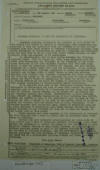
|
35. August 19,
1932. Naval Attaché,
Tegucigalpa. "Reported
Shipments of Arms and Ammunition
to Sandino," p. 1.
"Recently reliable information
was received in this office to
the effect that agents of
Sandino in Tegucigalpa were
negotiating the purchase of arms
and ammunition from San Salvador
to be sent to Nicaragua; also
that large amounts of Cordobas
(Nicaraguan currency) were being
circulated in Tegucigalpa and
sold at a discount, not
withstanding the fact that it is
at a par with United States
currency in Nicaragua, which act
appeared to be suspicious. ¶ An
investigation made by this
office revealed the following
apparent facts: That on August
12, 1932, large shipments were
removed from Tegucigalpa and
forwarded in the direction of
the Nicaraguan frontier; it has
been reliably reported that they
were shipments of arms and
ammunition intended for Sandino,
and that further shipments on a
lesser scale were sent out
yesterday. It was further
revealed that Toribio Tijerino
(suspected of having connections
with Sandino) and Alfonso Irias
of Danlí (known to have had
previous dealings with Sandino)
were directly responsible for
these shipments. The first and
larger of the two shipments was
said to contain sixty rifles and
60,000 rounds of ammunition for
them; the latter was of 10
pistols caliber .45 and 4,000
odd rounds of ammunition for
same, with smaller quantities of
lesser caliber pistol
ammunition. ¶ It is possible
that some of the Nicaraguan
currency which was circulated in
Tegucigalpa and said to come
from Sandino was money recently
paid by the family of a
Nicaraguan who was being held
captive by Sandino, Enrique
Sanchez S., as ransom for his
release and the following
numbers were taken:
denominations of 10.00 cordobas
Nos. A864157 and A847162;
denominations of 5.00 cordobas
Nos. 119926, 135660 and 141075;
in view of the possibility that
the Bank of Nicaragua may have a
record of the paid to his
family, which it is understood
was received from the branch
bank of Leon, Nicaragua. It is
further reported that additional
arms, namely 30 submachine guns
and a large quantity of
ammunition, have been ordered
through the firm Huber Brothers
of San Salvador and they are to
come via Amapala in the latter
part of this month. ¶ These
reports have been revealed to
the Government of Honduras by
this Legation with a view to
aiding them in capturing these
shipments in Honduras. ¶ Further
and more extensive
investigations are being made by
this office with a view to
obtaining positive information
which would enable the
Government to effect the arrest
of the individuals in this
reported illicit traffic of arms
which, however, is made
impossible without positive
proofs in view of the extreme
leniency of the laws in the case
of Honduran citizens. The two
individuals named in the second
paragraph are both citizens of
Honduras, Tijerino is Nicaraguan
by birth but is a naturalized
Honduran citizen and Irias is a
[stamp in the way of text]
Honduran. ¶ (See page two--) ¶
COPY FURNISHED: Comsperon – Sec.
Brig. USMC – Guardia Nacional,
Managua. . . . "
|
|
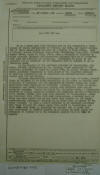
|
36. August 19,
1932. Naval Attaché,
Tegucigalpa. "Reported
Shipments of Arms and Ammunition
to Sandino," p. 2.
" . . . It is a known fact that
Tijerino had in his possession a
large number of recent
photographs of Sandino, his
wife, and bandit groups; one of
these photographs was seen by a
member of this office. Also a
reliable report indicates that
Manuel Balladares, (See Naval
Attaché report 72-32, dated 15
July, 1932), sent a telegram to
Tijerino in which although
indirect the statements indicate
that he is connected with some
new movement in Nicaragua.
Balladares is still in San
Salvador but he indicated in the
telegram that he intends to go
to Nicaragua soon. ¶ At the
request of the American Minister
in Tegucigalpa, the Naval
Attaché, accompanied by Mr.
Higgins, third secretary of the
legation, proceeded to Danlí on
August 16th [or 18th?], to
inform General Plata, newly
appointed Commandant of that
place of the reported movement
of arms and ammunition and to
ascertain his accomplishments
since taking over his new
duties. ¶ Although considerably
handicapped by the lack of
funds, General Plata is believed
to be doing everything in his
power to prevent arms shipments
to Nicaragua and the smuggling
of stollen [stolen] mules and
other contraband from Nicaragua
to Honduras. However, his force
is small, dismounted and poorly
equipped, having only obsolete
arms and no automatic weaposn
[weapons]. During the visit Dr.
Alejandro Cerda, a Nicaraguan
resident in Danlí, presented
himself and disclosed certain
information which checked fairly
well with that obtained in
Tegucigalpa. Cerda has furnished
this office with much
information, a certain part of
which has been useful but he has
never been trusted as the loyal,
conscientious government
official as he would like to
appear to the Naval Attaché. In
fact a report believed to be
reliable indicates that Cerda
brought the above money from
Danlí to Tegucigalpa and Plata
with whom Cerda is friendly was
advised not to place too much
confidence in Cerda’s reports as
he knows too much about the
movements of Sandino to be the
absolute neutral that he trys
[tries] to appear."
|
|
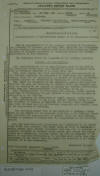
|
37. July 22, 1932.
Naval Attaché, Tegucigalpa.
"Reestablishment of
Extraordinary Forces on the
Nicaraguan Border," p. 1.
"Due to representations of the
American Legation at
Tegucigalpa, the President of
Honduras, on 16 [or 18?] July
1932, signified his willingness
to take certain steps to improve
conditions on the Nicaraguan
border relative to alledged
[alleged] activities of
Nicaraguan bandits and Sandino
sympathizers in that vicinity. ¶
The following action was
suggested by the American
Legation: ¶ PERSONAL AND
CONFIDENTIAL: ¶ 1st.
Reestablishment of the
expeditionary force in the zone
of the Nicaraguan border under
the command of General Alejandro
Plata with an effective strength
of at least fifty men. ¶ 2nd.
Again placing all local
commandants and sub-commandants
of the frontier including the
commandant of Danlí under the
orders of General Plata for the
persecution and capture of
bandits and revolutionists
against the Government of
Nicaragua who enter Honduras. ¶
3rd. Cause the searching of all
suspicious persons who cross the
frontier for arms and documents
or anything which may indicate
that they are bandits or are
engaged in helping the bandits,
confiscating their arms and
“reconcentrating” them according
to No. 4. ¶ 4th. “Reconcentrate”
in Tegucigalpa all persons,
either Central Americans or
foreigners, who are bandits or
are furnishing arms or
ammunition to the bandits. ¶
5th. Replacing the commandant of
Danlí, Colonel Emilio Valle, and
the sub-commandant of Las Manos,
Colonel Roberto Aleman U., and
the collector of revenue at
Yuscarán (El Paraiso) Señor
Alejandro Paz, with officers who
will effectively cooperate with
General Plata in the suppression
of banditry. ¶ The President
stated that he was desirous of
placing a large force on the
border but the depleted
condition of the National
Treasury prevented the
appropriation of special funds
for this purpose. However he
promised to comply with the
suggestions in the following
manner: ¶ 1st. The Executive
will discontinue at a sacrifice
to the localities which they
protect, five small posts in
order to establish a moving
patrol under General Alejandro
Plata who will be relieved as
Military Commander at Marcala;
which patrol will resume its
former duties as a Nicaraguan
frontier guard, and will be
composed of the number of
soldiers corresponding to the
five small posts thus
discontinued, as the budget does
not permit the creation of the
force referred to in the
memorandum. ¶ (Continued on page
[fold in paper] ¶ COPY
FURNISHED: Comsperon / SecBrig
USMC. . . . "
|
|
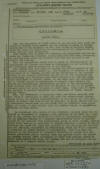
|
38. July 22, 1932.
Naval Attaché, Tegucigalpa.
"Reestablishment of
Extraordinary Forces on the
Nicaraguan Border," p. 2.
" . . . 2nd. The commandant of
Danlí cannot be nor has ever
been under the orders of General
Plata because the law forbids it
since it clearly establishes to
the contrary: to wit, that
Chiefs of military expeditions
are under the orders of the
commandants of the jurisdiction
in which they may find
themselves. ¶ 3rd. Orders will
be given for searching all
suspicious persons who cross the
Nicaraguan frontier, taking away
from them arms, documents, or
anything else which may indicate
that they are bandits or are
helping the bandits. ¶ 4th. The
appropriate orders will be given
to “reconcentrate” at
Tegucigalpa all Central
Americans or foreigners who are
bandits or are furnishing arms
or ammunition to the bandits. ¶
5th. Orders have been given to
replace the sub-commandant of
Las Manos, Colonel Roberto
Aleman U., The collector of
revenues of the Department of El
Paraíso, as well as all
collectors of the Republic
belong to the Finance Department
and not to the War Department
and consequently that collector
would have nothing to do with
the military activities of
General Plata. On the other hand
the commandant of El Paraiso
cannot be subordinate to General
Plata because the former has
departmental jurisdiction and
even if the administrator had
military rank, his rank would be
superior to that of an
expeditionary chief who is an
official of lower rank. Steps
will be taken to transfer to
another department the
commandant of Danlí, Colonel
Emilio Valle. ¶ 6th. The
Government of Honduras, which
has always complied with the
Pacts of Washington of 1923, and
with its international
obligations during the present
administration, is continuing
and will continue to comply with
them as far as permitted by
legal limitations and a
restricted budget such as that
which will be effective from
August 1st, and which is more
limited than the present budget
or anyprevious [any previous]
budgets for many years. ¶ In
compliance with orders of the
President, General Plata was
relieved as Commandant of
Marcala, which position he had
held for a period of six months,
and directed to report to
Tegucigalpa, preliminary to his
assuming command of a Special
Expeditionary force of
approximately 25 men obtained
from discontinued posts of rural
guards. General Plata while
serving as Commander of Marcala
received a salary of 150.00
Lempiras per month but Plata was
informed by the Secretary of War
that his new position,
supposedly an advancement, would
pay 90.00 Lempiras, a reduction
in salary instead of
advancement. When this fact was
brought to the attention of
President Colindres he stated
that the budget prohibited
paying General Plata any greater
amount but agreed to appoint
General Plata Commandant of
Danlí with special powers to
cover other localities along the
border, but not to designate him
as commander of a special border
patrol. ¶ (Continued on page
three . . . "
|
|
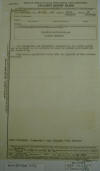
|
39. July 22, 1932.
Naval Attaché, Tegucigalpa.
"Reestablishment of
Extraordinary Forces on the
Nicaraguan Border," p. 3.
" . . . The twenty-five men
originally intended for the
border patrol are to be added to
the garrison at Danlí to provide
additional men for patrol duty.
¶ This latter appointment meets
with the approval of the
American Legation. ¶ COPY
FURNISHED: Comsperon / Sec.
Brigade, USMC, Managua"
|
|
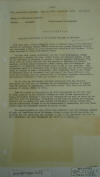
|
40. July 15, 1932.
Naval Attaché, Tegucigalpa.
"Political Activities of
Nicaraguans Residing in
Honduras."
"(COPY) ¶ N/A, Tegucigalpa,
Honduras, July 15, 1932. Serial
No. 72-32. File No.A8. ¶ Source
of Information reliable. ¶
Subject ¶ NICARAGUA ¶
Miscellaneous Intelligence. ¶ C
O N F I D E N T I A L ¶
POLITICAL ACTIVITIES OF
NICARAGUANS RESIDING IN
HONDURAS. ¶ On June 18th, Manuel
Balladares wrote to Colonel
Price of the Electoral Mission
in Nicaragua, making certain
declarations against President
Moncada and expressing a desire
to go to Managua and confer with
the Mission. Balladares received
no reply from Colonel Price. ¶
On June 25th, Manuel Balladares
and four other Nicaraguans,
namely Alberto Gamez, Toribio
Tijerino, Manuel Lacayo and
Fernando Larios, called on the
President of Honduras to propose
a Central American Conference
(Congreso Unido de Centro
America) for the purpose of
settling all Central American
problems among themselves
without taking them to
Washington. The question of an
agreement with Sandino would be
one of such problems. This
Conference would be a permanent
body to meet annually and all
five republics would be invited
to send a delegation. They
maintained that it was backed by
President Ubico of Guatemala,
and that one of its first
officials [official] acts would
be a request that the
intervention in Nicaragua
terminate immediately. The
President declined to take any
interest in the proposal. ¶ On
the same day Balladares obtained
permission from the Honduran
Government and left for his
hacienda on the Nicaraguan
frontier in company with the
Alcalde of Tegucigalpa, Jose
Maria Casco. This visit was for
the purpose of selling cattle to
Casco. ¶ Upon his return to
Tegucigalpa, no doubt
discouraged by the fact that he
found interest in his movement
lacking and that he was ignored
on all sides, Balladares
obtained a loan on the strength
of his sale to Casco and on July
9th, left for Salvador.
Balladares stated that his
reason for visiting Salvador was
to confer with Gen. Horacio
Portacarraro, obtain certain
Sandinista credentials alleged
to be in Portacarraro’s
possession, and with these
papers force the Electoral
Mission to listen to him. ¶ The
investigations of this office
have disclosed that the fabulous
amounts of arms and ammunition
which Balladares claims to have
in his possession are probably
his own inventions and intended
to add to his importance and
that of his activities, and thus
strengthen the bluff he is
making."
|
|
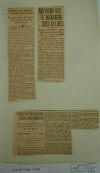
|
41. July 1932.
Press clippings: "Sandino
Gets $20,000 Ransome for
Captive,"
New York Times,
July 22, 1932.
"American Aid to
Nicaragua Cost 45 Lives,"
Washington Herald, July 22,
1932. "Fight in
Nicaragua Stirs Washington - One
Guardsman in Patrol Led by
marines, Is Killed in Clash With
200 Rebels - Plantations in
Peril - Rebels Coming Nearer to
Them and More Protection Is
Asked to Save Them," New
York Times,
July 28, 1932.
"SANDINO GETS $20,000
RANSOM FOR CAPTIVE ¶ Nicaraguan
Rebels Kill Eight in Raids—Three
Clashes With National Guard. ¶
Special Cable to THE NEW YORK
TIMES. ¶ MANAGUA, July 21.—Enrique
Fernando Sanchez Salinas, a
member of a prominent Leon
family, who had been held
captive six weeks by
Sandinistas, arrived in Managua
yesterday from the northern
department. ¶ Sanchez was
captured by the Sandino
chieftain, Juan Umanzor, and
held for a ransom said to be
$20,000. He was taken from the
plantation near Leon to
Sandino’s camp, a journey
requiring twenty-seven days
afoot and on horseback over the
most difficult country. ¶
Sandino, according to Señor
Sanchez, asked why the ransom
had not been paid. Señor Sanchez
replied it had already been
paid. The ransom arrived the
following day and Señor Sanchez
was released. He arrived under
escort from Paso Real thirteen
days later. ¶ Señor Sanchez said
he had no idea of the location
of Sandino’s camp except that it
was in the mountains of Northern
Nicaragua. ¶ National Guard
headquarters report that on July
17 a group of rebels thought to
be under the leaders Irias and
Mairena sacked two stores at
Panamerica and Morazan, along
the Rio Grande in the department
of Rio Grande on the east coast.
Three British and five
Nicaraguan employes [employees]
of the stores were killed, and
merchandise of considerable
value was taken. ¶ National
Guard patrols started in pursuit
of the irregulars, and contact
was made with one rebel group
yesterday and loot from one of
the stores was recovered. ¶ On
July 17 eleven National
Guardsmen, led by Lieutenant
Walter J. Stone, engaged forty
rebels near Panamerica. After
brisk fighting, the rebels fled,
leaving two dead. There were no
guard casualties. ¶ Lieutenant
Sidney M. Ragsdale, with a
patrol of twenty-seven men, made
two surprise attacks on rebels
on July 17 and 18 at Las
Sandillas and Quiataco. Two
rebels were wounded in the first
clash and three in the second.
There were no guard casualties.
¶ AMERICAN AID TO
NICARAGUA COST 45 LIVES ¶
Marines to Return Home After
Elections; Guard Soon Able to
Take Command ¶ American
occupation of Nicaragua has cost
the lives of 45 Marines, the
State Department announced
yesterday in a detailed report
of relations since 1926, when
President Coolidge sent troops
there to protect American
interests. ¶ As a result of this
occupation, it was stated,
banditry has been largely
suppressed and order restored in
the various provinces. There
have been few outbreaks of any
consequence in recent months
and, with the force of Marines
now on duty, it will be easy to
conduct an orderly election next
November, it was stated. ¶ The
Guardia Nacional has been
trained by the Marines to a
point of efficiency which will
enable the Marines to retire
after the election, the report
said. The higher commands are
held by U. S. Marines, but will
be surrendered to the natives
after the election. ¶
FIGHT IN NICARAGUA STIRS
WASHINGTON ¶ One Guardsman, in
Patrol Led by Marines, Is Killed
in Clash With 200 Rebels. ¶
PLANTATIONS IN PERIL ¶ Rebels
Coming Nearer to Them and More
Protection Is Asked to Save
Them. ¶ By
Tropical Radio to THE NEW YORK
TIMES. ¶ MANAGUA, Nicaragua,
July 27.—Two hundred
rebels led by Chieftains Juan
Gregorio Colindres and Juan
Pablo Umanzor attacked a small
patrol of Nicaraguan guardsmen
near Pavonia, north of Yali,
yesterday killing one guardsman
and wounding three. The guard
patrol was commanded by
Lieutenants Cecil D. Snyder of
Houston, Texas, and Lyman F.
Wariston of Springfield, Mo. ¶
The engagement was bitterly
fought, lasting a half-hour. The
guardsmen then returned to Yali
to obtain reinforcements and
ammunition and later pursued the
rebels to the frontier. The
rebel casualties are not known
to headquarters. ¶ The guards
report the rebels were well
armed with automatic weapons. ¶
An Italian coffee planter near
Matagalpa has advised the
Italian Chargé d’Affaires that
the rebels are coming nearer to
the plantations and he fears
that unless more protection is
given he will have to abandon
his. ¶ WASHINGTON, July
27 (AP).—The Navy
Department today was watching
the Nicaraguan situation closely
after reports of a fierce
engagements between insurgents
and a guard patrol led by Marine
Corps officers. ¶ The fight
yesterday, one of a series
during the past few weeks, took
place about twenty-five miles
south of Ocotal and so
determined was the resistance of
about 200 insurgents that the
patrol retired for more
ammunition. ¶ The report of the
engagement to the Navy
Department said the insurgents
were entrenched and were armed
with rifle grenades and bombs in
addition to small arms. ¶ There
was no data available on
insurgent casualties, the report
said, adding that other Guard
patrols were advancing on the
band."
|
|
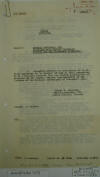
|
42. July 5, 1932.
Captain Robert E. Cummings,
Acting Military Attaché, Mexico
City. Translation of
article in
La Prensa,
July 3, 1932, of "bulletin
received from the Sandino
headquarters in Nicaragua by Dr.
Zepeda, General Representative
of the 'Defense of the National
Sovereignty of Nicaragua' Army,"
p. 1.
"G-2 Report ¶ 3850-a ¶ MEXICO ¶
POLITICAL ¶ SUBJECT: Foreign
Relations, etc. ¶ Relations with
Foreign Countries: ¶ SANDINO and
the Nicaraguan Situation. ¶ 1.
Forwarded herewith is
translation of an article
appearing in “La Prensa” of July
3, 1932, purporting to be a
bulletin received from the
Sandino headquarters in
Nicaragua, by Dr. Zepeda,
General Representative of the
“Defense of the National
Sovereignty of Nicaragua” Army.
¶ Robert E. Cummings, ¶ Captain,
Infantry, DOL ¶ Acting Military
Attaché. ¶ Source: As stated. ¶
C/p ¶ From: M.A.Mexico. ¶ Report
No. 4013. ¶ Date: July 5, 1932."
|
|
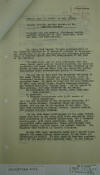
|
43. July 5, 1932.
Captain Robert E. Cummings,
Acting Military Attaché, Mexico
City. Translation of
article in
La Prensa,
July 3, 1932, of "bulletin
received from the Sandino
headquarters in Nicaragua by Dr.
Zepeda, General Representative
of the 'Defense of the National
Sovereignty of Nicaragua' Army,"
p. 2.
"(Translation[)] ¶ ARTICLE FROM
“LA PRENSA” of July 3, 1932. ¶
Sandino inflicts serious defeats
on the American Marines. ¶ In
nearly all the combats,
Nicaraguan bandits captured
quantities of arms, munitions,
machine guns, and hand-grenades.
¶ Dr. Pedro José Zepeda, General
Representative of the “Ejercito
Defensor de la Soberanía
Nacional de Nicaragua”, has
turned over to us for
publication the following
bulletin which he received
direct from the headquarters of
the Army in the Segovias: ¶ “We
were right when we said
previously that the enemy itself
would publish reports regarding
our military movements, and
those reports are the best
evidence of the losses in arms
and men which they are
constantly suffering, through
their international policy in
Nicaragua. ¶ “On May 4th of this
year the ex-guards belonging to
the enemy forces in Kizalaya
[Kisalaya], on the Atlantic
coast of Nicaragua, rebelled
against the Yankee filibusters
who commanded them. In order to
carry out the plan entrusted to
them, they killed Lieut. Charles
Lebosque [Levonski], American,
and wounded 2nd. Lieut. Charles
Rayo. As the spoils of this
uprising, our Army received the
following: ¶ 21 Springfield and
Lewis rifles, among them, some
bomb-throwers; ¶ 21 grenades; ¶
1 Thompson machine-gun with
1,600 rounds of Lewis
ammunition. ¶ This was all
delivered by the ex-guards
Sebastian Jiménez, Felipe
Briseño, Francisco López and
Aurelio Flores, who are now in
the service of our Army. The
arms were received by General
Estrada, General Morales, and
Colonel Socrates Sandino. ¶ “On
May 11th three artillerymen of
the enemy detachments came over
to our ranks, with their
respective equipment consisting
of 1 Brownie [Browning?]
machine-gun, and 2 Thompson
machine-guns, with their
ammunition, hand bombs, and
Springfield rifle ammunition.
These artillerymen were Antonio
Garcia, Balvino Hoyos, and
Antonio Cornejo. The supplies
were received by General
Colindres. ¶ On May 15th Capt.
Heriberto Reyes led a bloody
fight against the enemy, lasting
three hours, in San Lucas
jurisdiction, of Ocotal. In this
fight 30 traitors perished, and
1 of the pirates who commanded
them. On our side, we . . . "
|
|
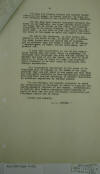
|
44. July 5, 1932.
Captain Robert E. Cummings,
Acting Military Attaché, Mexico
City. Translation of
article in
La Prensa,
July 3, 1932, of "bulletin
received from the Sandino
headquarters in Nicaragua by Dr.
Zepeda, General Representative
of the 'Defense of the National
Sovereignty of Nicaragua' Army,"
p. 3.
" . . . On June 1st Colonel
Salgado led another bloody
attack on the enemy, in Ciudad
Antigua, in which we lost
Federico Tercio, of San Marcos
de Colón, Honduras. ¶ “On the
same date General Colindres
attacked the enemy in Los
Bellorín, the fight lasting
three hours. The enemy left 36
killed on the field, and
supplies consisting of 14 woolen
blankets, 3 capes, etc., and a
field tent. On our side we lost
Juan Pablo Bellorín, the owner
of the ranch on which the fights
took place. ¶ “To sum up the
foregoing, we lost during the
fights in the month of May, 10
killed and 4 wounded. The enemy
losses were 131 killed and 30
wounded. And we captured from
the enemy a total of 39 rifles,
7 machine-guns, 32 bombs, 18,740
cartridges, and 6 pistols .45. ¶
“I take this opportunity to say
to our compatriots abroad that
our Army, today as yesterday, is
convinced that Nicaragua can
only win her liberty by gunfire
and loss of our own blood, and
that we shall prevent, by force
of right and arms, any election
farce attempted to be held again
in Nicaragua with foreign
supervision. ¶ “All Nicaraguans
interested in the cause of
nationalism will be welcome to
the ranks of our Army, provided
they are not bound to any party
and will obey our code, which
prohibits us from maintaining
relations with political parties
intending to present themselves
in elections supervised by
foreign powers. ¶ “We are
watching the Moncada proposals
to amend the Constitution of
Nicaragua in order to legalize
the Bryand-Chamorro
[Bryan-Chamorro] treaties of sad
renown. Nevertheless, we declare
that before accepting those
treaties as legal, we will see
the last Nicaraguan annihilated,
and Nicaragua itself lie in
ashes. ¶ “Patria and Liberty. ¶
A. C. SANDINO.”"
|
|
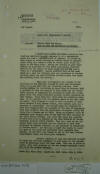
|
45. July 1, 1932.
A. R. Harris, Military Attaché,
Costa Rica, "Sale of Arms and
Ammunition to Sandino," p. 1.
"S E C R E T ¶ A.R.H.Maj.G.S. ¶
July 1, 1932. ¶ G-2 Report. ¶
2700. ¶ COSTA RICA (Population &
Social) ¶ Subject: Public Order
and Safety. ¶ Sale of Arms and
Ammunition to Sandino. ¶ About
three months ago there arrived
in San José one Guillermo
Lacayo, supposed to be a
communistic agent and also a
representative of Sandino. He
seemed to have plenty of money
although no visible means of
support. After being here
several weeks he became quite
drunk one night at the Union
Club. During the evening he grew
boisterous and proceeded to tell
Señor Abel Robles (formerly head
of all the police of Costa Rica)
that he had been a “hell of a
policeman”. Lacayo asserted that
he had used Limon as a base for
shipping arms and ammunition to
Sandino directly under the nose
of Robles without Robles ever
knowing anything about the
matter. ¶ When this conversation
was brought to the attention of
the Military Attaché he made
such investigations as he was
able with the following results:
That shortly before the
revolution in Costa Rica in
February 1932 a quantity of arms
was shipped to Port Limon for
the ostensible purpose of
supplying the garrison in Limon
for a campaign which was being
organized against bandits
operating in that region. These
arms were taken from the
Artillery Cuartel. It is
reported that two hundred cases
in all were sent to Limon. This
shipment is said to have
consisted of some three hundred
7 m.m. Mauser rifles, four
machine guns and a quantity of
ammunition. The machine guns are
reported to have been stamped
with the insignia of the Army of
Guatemala. They were procured
from the Guatemalan Government
during the Costa Rica – Panama
war in 1921. Later on, eighteen
cases of munitions were shipped
back to San José but were
returned to the Bella Vista
Cuartel. The other 180 cases are
reported to have been sold to
Sandino by the then Minister of
Public Security, General Arturo
Quirós. They were sent up the
Atlantic Coast very secretly and
are reported to have been
delivered to Sandino somewhere
in the vicinity of Bluefields or
farther north. The Military
Attaché was unable to learn the
name of the agent who purchased
these supplies from Quirós. It
may have been Lacayo or one of
the many Sandino sympathizers
among the Nicaraguan refugees. ¶
Another shipment of arms was
secretly brought to Limon and
secretly reshipped to some point
on the eastern coast of
Nicaragua about the same time.
This was in March or April. This
last shipment is the one Lacayo
evidently referred to in his
drunken moments. ¶ From: M.A.
Costa Rica ¶ Report No. 1664 ¶
Date: July 1, 1932."
|
|
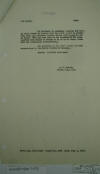
|
46. July 1, 1932.
A. R. Harris, Military Attaché,
Costa Rica, "Sale of Arms and
Ammunition to Sandino," p. 2.
" . . . G-2 Report. ¶ 2700. ¶ My
informant is extremely reliable
and there is every reason to
believe that the above report is
absolutely true. My informant
further states that Lacayo is
now in Paris. This may mean that
he has transferred his
headquarters from Mexico to
Europe so as to be in closer
touch with the communistic
headquarters. ¶ The substance of
the above report has been
communicated to the Marine
Brigade in Managua. ¶ Source:
Reliable informant. ¶ A. R.
Harris, ¶ Major, G.S., M.A. ¶
From: M.A. Costa Rica ¶ Report
No. 1664 ¶ Date: July 1, 1932."
|
|
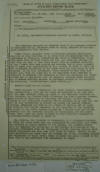
|
47. July 15, 1932.
Naval Attaché, Tegucigalpa. "Dr.
CERDA, Alejandro--Nicaraguan
resident in Danlí, Honduras," p.
1.
"The following telegram was
recently sent by the Honduran
Minister of Government to Dr.
Alejandro Cerda at Danlí,
relative to his supposed
cooperation with Sandino: ¶
“Señor Doctor Alejandro Cerda
G.--Through repeated information
received in this Ministry, it is
known that you sympathize with
the Sandinismo in Nicaragua,
furnishing all kinds of
assistance. It is also known
that you have housed and fed,
and still do, persons who come
from the camp of that rebel
chief; from my personal
knowledge of you I doubt that
such reports are certain, but to
cover yourself and to prove your
impartiality in this matter, it
would be well for you to publish
statements in the press which
are very clear in this respect.
As you will understand, these
reports do more than just injure
you, they are injurious to the
relations which Honduras is
obligated to maintain with
Nicaragua as they are neighbors
and sister nations and in
conformity with the existing
treaties which obligate her to
remain strictly neutral in
political matters of the
neighboring countries.
Affectionately, Angel Sevilla
p.” ¶ Cerda’s reply was as
follows: ¶ “Señor Minister of
Government, Don Angel Sevilla,
Tegucigalpa.--The persons whom I
have had the honor to entertain
in my home are: the boy Paco
Paniagua Prado, by order of the
Excellent President of the
Republic, Dr. Vicente Mejía
Colindres; Don José Francisco
Moncada, ex-Minister of
Nicaragua in Honduras; and
General Alberto Reyes, Deputy to
the Nicaraguan Congress, who is
actually in my home now, and who
is here endeavoring to locate
his cousin Don Enrique Sanchez
Salinas, kidnapped and held by
the forces of Sandino, all of
which is known by the Private
Secretary to the President of
the Republic. In regard to the
other charges against me I
request that you inform yourself
with the American Legation in
Tegucigalpa, who can clear them.
Thus I have the honor to reply
to your attentive telegram of
yesterday. Affectionately A.
Cerda G.” ¶ Mr. Sevilla, the
Minister of Government, is a
prominent resident of Danli and
knows Cerda well and personally
was convinced that Cerda was
innocent of aiding Sandino or
his agents. Mr. Sevilla stated
that the telegram was occasioned
by the receipt of a message by
the Honduran Government from the
Nicaraguan Foreign Minister
stating that Manuel Balladares
had been seen with Cerda in
Danli. Sevilla stated that
Balladares and Cerda were old
friends and it was perfectly
natural for Balladares to visit
Cerda. Cerda informed the Naval
Attaché at the time that he had
conversed with Balladares in
Danlí. . . . "
|
|
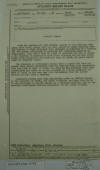
|
48. July 15, 1932.
Naval Attaché, Tegucigalpa. "Dr.
CERDA, Alejandro--Nicaraguan
resident in Danlí, Honduras," p.
1.
" . . . Both Mr. Sevilla and
Abel Gamero, Deputy to the
Honduran Congress from Danlí,
state that the only person in
Danlí actually aiding Sandino is
José Idiaquez; that Idiaquez is
somewhat of a fanatic and the
actual assistance he rendered
the Nicaraguan bandits is
negligible. They admit that it
would be possible for him to
obtain a few handfuls of
ammunition from local soldiers
but as only fifty rifles with
ammunition for same are kept in
Danlí, no great amount could be
obtained there. ¶ The Minister
of Government stated that a
report had been received that
Manuel Balladares took two
machine-guns with ammunition
with him when he went to Danlí,
but that he was positive that
this information was false as he
was informed by a close relative
who went to Danlí in the same
car with Balladares that the
latter carried no more than a
handbag. ¶ Sandino’s forces have
been positively known to inflict
losses on the property of Cerda,
and Cerda therefore realizes
that it is to his advantage to
appear openly as a friendly
neutral, but he has secretly
volunteered certain assistance
to the Naval Attaché. ¶ COPY
FURNISHED: Sec. Brig. USMC,
Managua."
|
|
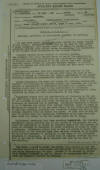
|
49. July 15, 1932.
Naval Attaché, Tegucigalpa.
"Political Activities of
Nicaraguans Resident in
Honduras.
"On June 21st Manuel Balladares
again visited the Naval Attaché
in his office. Balladares stated
that he had read in “The
Pueblo”, a local newspaper, that
Sandino would not accept as
President any candidate elected
under United States supervision.
The translation of the article
which originated in San Salvador
follows: ¶ “SANDINO ACCEPTS
CARAZO HURTADO OR CALDERON
RAMIREZ. ¶ San Salvador (AP)
V.C.- Sandino wrote to one of
his sympathizers saying that he
would not recognize any
President of Nicaragua who is
elected under supervision of
United States, but would
recognize Evaristo Carazo
Hurtado or Salvador Calderon
Ramirez if elected after the
marines had evacuated the
country and thus would the
revolt be ended.” ¶ Balladares
remarked that this statement was
contrary to the statements made
by Sandino to him and such being
the case he was willing to
return to Nicaragua and issue a
manifesto to the people
declaring Sandino an
irresponsible outlaw with no
good intentions. ¶ Manuel
Balladares was asked his reason
for visiting Sandino and
replied: “My intention in
visiting Sandino was honorable
and for the purpose of
establishing a background and
exacting a promise from Sandino
which could be used in the
pacification of Nicaragua.[”]
Naturally he had to convince
Sandino that he had something to
offer otherwise he would not
have been received in his camp.
¶ Balladares claims that the
pacification of Nicaragua is his
one and only desire that he
never had any intentions of
joining Sandino in his banditry
as such move would accomplish no
more than to keep Nicaragua in
upheaval and in poverty.
Balladares expressed a desire to
go to Managua and confer with
Admiral Woodward, Chief of Board
of Elections, to explain to him
the real object in his recent
activities. He admitted personal
animosity for President Moncada
but that it was nothing compared
with his desire for peace. He
said that he did not care to
confer with the Nicaraguan
Government as he knew that
Moncada would not listen to him
but simply place him in jail. ¶
Balladares’ movements have been
somewhat restricted, the
Honduran Government having
confined him to the limits of
Tegucigalpa and refused him
permission to travel in Honduras
except for the purpose of going
to Salvador or Guatemala to
which countries he would be
given a passport. Balladares
stated that he did not intend to
leave Honduras until he had
received word from Admiral
Woodward as to whether or not he
was desirous of listening to his
ideas of the political situation
in Nicaragua. He stated that if
Admiral Woodward did not care to
see him he would go to Salvador
and give up his plan of
pacification. ¶ The Naval
Attaché informed Balladares that
neither he nor the American
Legation at Tegucigalpa had
authority to assist him or to
act as an intermediary for him.
However if he desired to confer
with Admiral Woodward he was at
liberty to communicate with him
upon the Admiral’s arrival in
Managua."
|
|
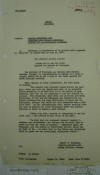
|
50. July 5, 1932.
Captain Robert E. Cummings,
Acting Military Attaché, Mexico
City. Translation of
article in
Excelsior of
Mexico City on June 16, 1932,
"The Children Address Sandino,
Asking him to end the fight
Against the Invader of
Nicaragua."
"G-2 Report ¶ 3950-a ¶ MEXICO ¶
POLITICAL ¶ SUBJECT: Foreign
Relations, etc. ¶ Relations with
Foreign Countries: ¶ SANDINO and
the Nicaraguan Situation. ¶ 1.
Following is translation of an
article which appeared in
“EXCELSIOR” of Mexico City on
June 16, 1932. ¶ THE CHILDREN
ADDRESS SANDINO ¶ Asking him to
end the fight Against the
Invader of Nicaragua ¶ The
children of Nicaragua are
calling upon General Sandino,
through his representative in
Mexico, Dr. Pedro J. Zepeda,
asking him to put a stop to the
fight against the North American
invaders. ¶ Their message is
truly significant, the text
being as follows: ¶ “The schools
have remained closed during the
past year, which has made our
hearts very sad, as we earnestly
desire education as we know that
it is the source of many
benefits, both for the one
acquiring it and for society in
general. With education, many
evils are prevented and crime
diminished; if the men who
kidnapped and assassinated the
little Lindbergh boy had been
cultivated, in heart and
intelligence, perhaps they would
not have committed such a
terrible deed. And we,
understanding this, suffer
terribly from the lack of
schools for every Nicaraguan
child who desires learning in
order to become a good citizen.
¶ “Aside from this, poverty is
increasing in our beloved land,
- and poverty brings crime in
its wake. ¶ “We know that you
represent General Augusto C.
Sandino, our co-national, and
through you we would like to
reach him with our voice of
anguish, - demanding peace for
Nicaragua, and the ending of
fratricidal strife, which has no
right to be, - in order that in
the future our Fatherland shall
be great and our sovereignty
maintained intact.” ¶ Robert E.
Cummings, ¶ Captain, Infantry,
DOL ¶ Acting Military Attaché ¶
C/p ¶ Source: As stated. ¶ From:
M.A.Mexico. ¶ Report No. 3985. ¶
Date: June 17, 1932."
|
United States National Archives, Record Group
165, Entry 77, Box 2653.
|
